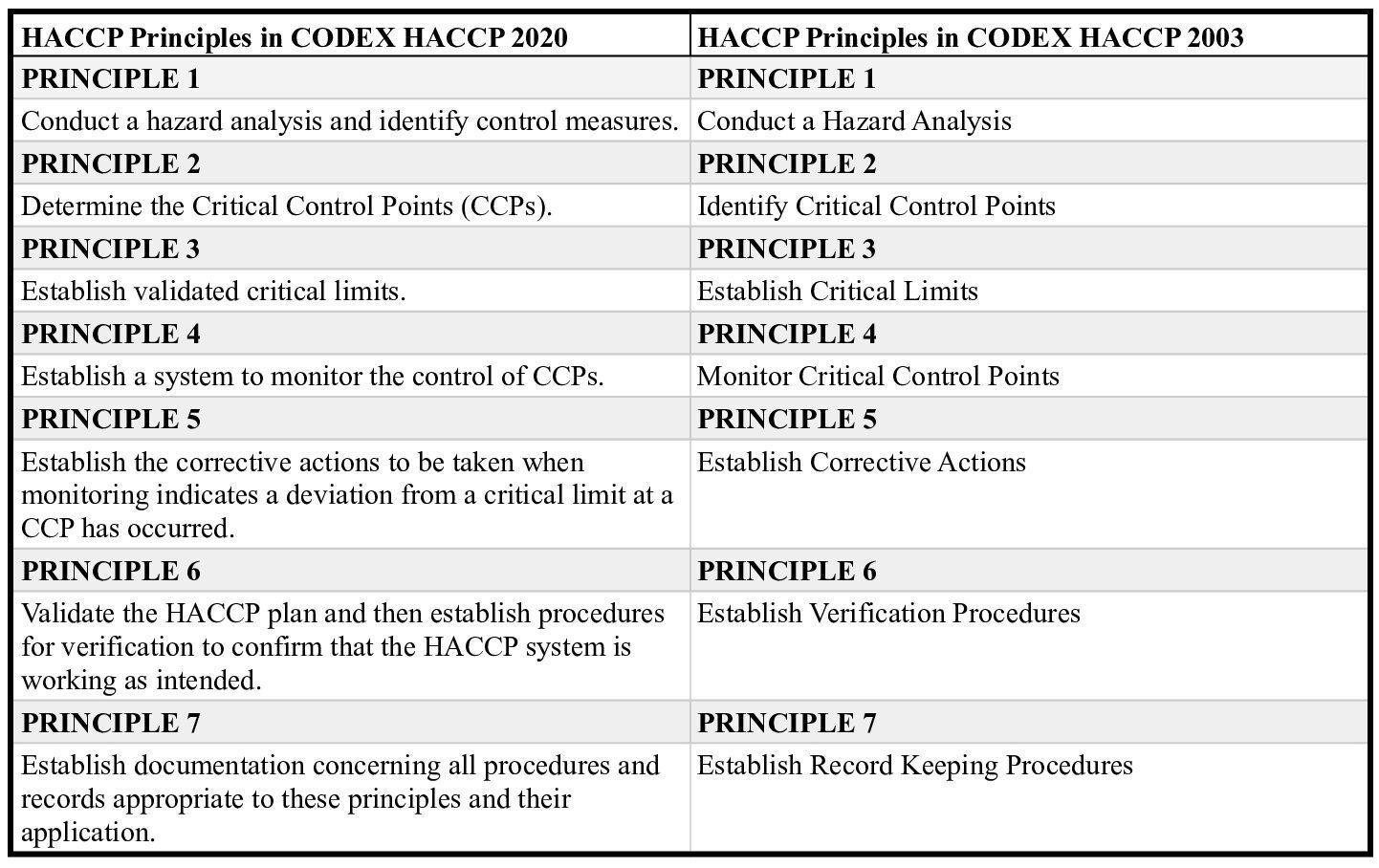In food safety, we rely on the fundamental Hazard Analysis and Critical Control Point (HACCP) principles developed to identify and mitigate identified hazards to an acceptable level. HACCP forms the basis of most food safety plans we build and adopt for our food business.
In 2020, the FAO (Food and Agriculture Organization) published a revised version of CODEX HACCP requirements. The main goal of the CODEX HACCP 2020 is to improve food safety worldwide. The CODEX HACCP 2020 guide is an exhaustive resource that covers everything from understanding the risk assessment and hazard analysis processes to implementing preventive controls and monitoring procedures.
By implementing these updated guidelines, businesses can ensure that their foods are safe to consume and meet global quality standards. We highlight significant changes and additions in the next section.
Importance of the HACCP program:
Most food safety certification requirements require that the person responsible for overseeing a food safety plan have a HACCP refresher at least every 5 years. While you may think this is a waste of time and resources, it is necessary to ensure that food safety professionals stay updated with the updated HACCP requirements. If your HACCP refresher training is not due, this blog post is for you. This article will discuss the top 3 changes to HACCP requirements in 2020.
What are the CODEX HACCP 2020 changes?
Management commitment requirements for food safety culture
The CODEX HACCP 2020 emphasizes the role of food business operators (FBO) in ensuring food safety. You will see the emphasis placed on FBO instead of food safety professionals or a QA Manager.
This is great news for food safety professionals and the food business as it helps everyone in the food business to be equally accountable when managing their own food safety programs. With a functional operations team, food businesses can be aware of any minor issues before they become a larger food safety incident (e.g. food poisoning, food allergen recall etc).
HACCP Principles Terminology Updates

At a glance, the new CODEX HACCP Principles look longer and wordier. They are not new concepts, but rather, the wordings provide more clarity on the HACCP implementation steps.
Allergen management
Along with the CODEX HACCP 2020, the Code of Practice on Food Allergen Management for Food Business Operators was also adopted in 2020.
The Code of Practice specifies the common global food allergens, including
- cereals containing gluten (i.e. wheat, rye, barley, oats2, spelt or their hybridized strains)
- crustaceans
- eggs
- fish
- milk
- peanuts
- soybeans
- tree nuts
Note: major allergens declaration may be different for different countries of manufacture and/or sale.
The CODEX HACCP 2020 emphasizes the requirements for identifying allergen presence throughout the process and controls that must be implemented to prevent cross-contamination from allergen to non-allergen. It also highlights that consumers should be informed of any unavoidable cross-contact (despite controls).
Please note the word “despite control” -we will need to perform allergen control and not solely rely on the precautionary labelling.
Now that you are aware of the main changes in the CODEX HACCP 2020, it is time to start implementing them into your food safety management system. Below we will provide some tips on how to apply these changes.
How do I apply the changes to my food production process?
It is important to follow its step-by-step HACCP process to understand the changes and how they will impact your food production process.
To begin preparing for the changes brought on by CODEX HACCP 2020, take time to review your current food production process. This will help you to identify areas where improvements or modifications may be necessary. You can also apply a change management plan to assist you in tracking progress, allocating resources effectively, and ensuring that the updates are implemented successfully.
Steps to take when reviewing your food safety program:
1) Review your current procedures and make sure they meet the updated requirements of the CODEX HACCP 2020. The review includes ensuring that all hazards identified during risk assessment have been controlled at each stage of production or handling.
2) Update your Hazard Analysis Critical Control Points (HACCP).
The updated HACCPs will help ensure that your food is produced under safe conditions by specifying which hazardous activities need specific controls in place. It is important to note that not all stages of production will require a separate HACCP; instead, an overall HACCP should be developed for the entire facility.
Understand your Critical Control Points (CCPs). The CCPs are specific points within your food production process where intervention is required in order for your food product to meet legal food safety standards. You must know which CCPs apply to your business and adhere strictly to them in order to avoid food safety issues and ensure product quality.
3) Build Management Commitment and Food Safety Culture
Food safety is one of the most important aspects of any business, and management must be strongly commitment to ensuring it’s maintained. It can be difficult to achieve commitment to safe practices if there isn’t a food safety culture built within the organization. In order to build a management commitment and create a food safety culture, you must implement changes across all levels of the organization.
Here are some tips for building a food safety culture:
1) Create and implement an effective food safety plan.
2) Train your staff on how to properly handle food and comply with HACCP requirements.
3) Make sure your facility is clean and free from potential sources of contamination.
4) Establish clear lines of communication between management and staff members responsible for food safety.
5) Listen to your staff for food safety improvements to advance food safety practices.
Conclusion:
As a food manufacturer, it’s critical to be educated on the HACCP changes introduced by Codex HACCP 2020. By following the guidance in this blog post, you’ll be able to keep up with the HACCP updates, implement an effective food safety program and keep our food safe. Thank you for reading, and we hope that this information was helpful!
Blog authored by Felicia Loo, edited by Karine Lawrence
Need to develop or update a HACCP plan to meet regulatory or industry certification requirements? Contact Sirocco to discuss your food safety plan needs and food safety implementation with our GFSI and HACCP consultants.





